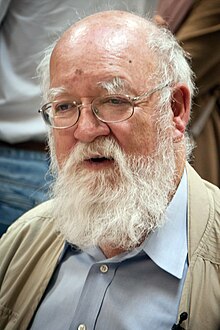Daniel C. Dennett
| Daniel Dennett | |
|---|---|
 |
|
| Born |
Daniel Clement Dennett III March 28, 1942 Boston, Massachusetts, U.S. |
| Alma mater |
Harvard University (A.B.) Hertford College, Oxford (D.Phil.) |
| Awards | Jean Nicod Prize (2001) |
| Era | 20th/21st-century philosophy |
| Region | Western philosophy |
| School | Analytic philosophy |
|
Main interests
|
Philosophy of mind Philosophy of biology Philosophy of science Cognitive science Free will |
|
Notable ideas
|
Heterophenomenology Intentional stance Intuition pump Multiple Drafts Model Greedy reductionism Cartesian theater |
|
Influences
|
|
|
Influenced
|
|
| Signature | |
 |
|
Daniel Clement Dennett III (born March 28, 1942) is an American philosopher, writer, and cognitive scientist whose research centers on the philosophy of mind, philosophy of science, and philosophy of biology, particularly as those fields relate to evolutionary biology and cognitive science.
He is currently the co-director of the Center for Cognitive Studies and the Austin B. Fletcher Professor of Philosophy at Tufts University. Dennett is an atheist and secularist, a member of the Secular Coalition for America advisory board, and a member of the Committee for Skeptical Inquiry, as well as an outspoken supporter of the Brights movement. Dennett is referred to as one of the "Four Horsemen of New Atheism", along with Richard Dawkins, Sam Harris, and the late Christopher Hitchens.
Dennett is a member of the editorial board for The Rutherford Journal.
Dennett was born on March 28, 1942 in Boston, Massachusetts, the son of Ruth Marjorie (née Leck) and Daniel Clement Dennett, Jr. Dennett spent part of his childhood in Lebanon, where, during World War II, his father was a covert counter-intelligence agent with the Office of Strategic Services posing as a cultural attaché to the American Embassy in Beirut. When he was five, his mother took him back to Massachusetts after his father died in an unexplained plane crash. Dennett's sister is the investigative journalist Charlotte Dennett. Dennett says that he was first introduced to the notion of philosophy while attending summer camp at age 11, when a camp counselor said to him, "You know what you are, Daniel? You're a philosopher."
...
Wikipedia
